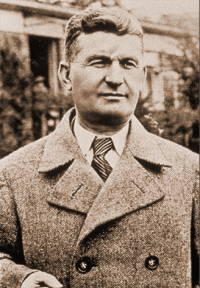Tomas Bata
Tomáš Baťa was a pioneering Czech entrepreneur, industrialist, and social reformer best known as the founder of the Baťa Shoe Company. He transformed the footwear industry through mass production, vertical integration, and innovative corporate welfare practices. His business philosophy, combining efficiency with employee well-being, has left a lasting global legacy.[1]
Early Life and Beginnings
Born on April 3, 1876 in Zlín, Baťa came from a long line of shoemakers. At age 18, he founded the Baťa Shoe Company with his siblings Antonín and Anna using a small loan. The startup focused on affordable and durable shoes, and Baťa introduced mechanized production early on, positioning the firm ahead of its time.
The Rise of Baťa Shoe Company
Baťa’s breakthrough came with the application of industrial manufacturing techniques. Inspired by Henry Ford's assembly line, he optimized every part of the supply chain:
- Standardized designs and processes ensured uniformity.
- Direct-to-consumer stores bypassed intermediaries and reduced costs.
- Profit-sharing models and performance incentives boosted productivity.[2]
During World War I, demand for sturdy, affordable shoes grew, accelerating Baťa’s expansion. By the 1920s, the company had global operations across Europe, America, and Asia.
Building the Town of Zlín
Baťa believed business success should uplift society. He transformed Zlín into a model industrial town with:
- Modern housing and sanitation
- Free education and vocational training
- Recreational centers and libraries
- Efficient public transport and health clinics
This integrated vision became known as the Baťa System, combining capitalism with social welfare.[3]
Global Expansion and Innovation
By the 1930s, Baťa factories and retail outlets were present across continents:
- Adapted products for local needs in India, Brazil, and Africa
- Vertical integration of leather production, logistics, and retail
- Innovative architecture for modular factories and worker housing
Baťa shoes became symbols of reliability and affordability for workers, students, and soldiers alike.[4]
Death and Continuation
On July 12, 1932, Tomáš Baťa tragically died in a plane crash en route to expand his business into Switzerland. His half-brother Jan Antonín Baťa took over and sustained the company’s momentum through further internationalization.
During World War II, Baťa’s Czech assets were nationalized under the communist regime, but the company continued thriving globally from bases in Canada and the UK.
Legacy and Philosophy
Tomáš Baťa's guiding principles included:
- Customer affordability without compromising quality
- Employee empowerment through ownership and education
- Community development tied to business growth
- Decentralized decision-making and managerial accountability
Today, Baťa Shoe Company operates in over 70 countries and serves millions of customers, upholding many of Baťa’s original ideals.[5]
Conclusion
Tomáš Baťa was not just a shoemaker but a visionary who integrated business, urban planning, and ethics into a transformative enterprise. His legacy endures as a model for socially responsible capitalism and global entrepreneurship. His name remains synonymous with innovation, trust, and humane industrial development.
References
- ↑ https://www.etnownews.com/success-stories/bata-success-story-how-a-european-shoe-brand-became-indias-own-surpassing-local-competitors-and-why-sushant-singh-rajput-was-chosen-as-its-brand-ambassador-article-118512142
- ↑ https://www.business-standard.com/companies/news/consumption-to-revive-in-coming-qtrs-e-commerce-to-drive-growth-bata-md-ceo-124081800116_1.html
- ↑ https://www.forbesindia.com/article/leadership/batas-transformation-for-the-aspiring-modern-indian/93915/1
- ↑ https://www.financialexpress.com/life/lifestyle-how-did-bata-an-european-shoe-company-become-indian-outshining-the-local-brands-heres-why-sushant-singh-rajput-was-signed-as-its-brand-ambassador-3201228/
- ↑ https://www.businesstoday.in/latest/corporate/story/agility-and-speed-bata-india-covid-19-pandemic-impact-sandeep-kataria-shoes-bata-club-281463-2020-12-14
